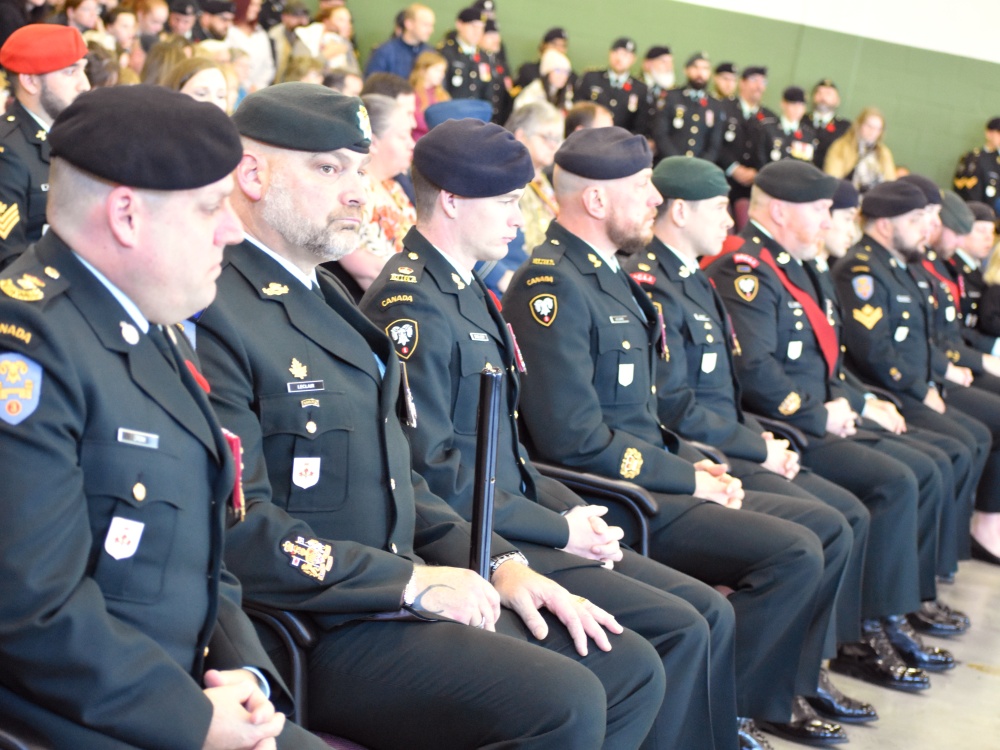
Military participants at CFB Shilo’s Remembrance Day ceremonies on Nov.11, some who class themselves as Veterans, and some who want to hold onto the moniker for the future. K-J Millar/Shilo Stag News
K-J Millar
Shilo Stag News
With Veteran’s week just past and Remembrance Day still close in our hearts, the definition of what a Veteran is holds different meanings and imagery for many people.
According to Veterans Affairs Canada (VAC), a veteran is “Any former member of the Canadian Armed Forces who successfully underwent basic training and is honourably discharged.”
When people think of Veterans, many immediately picture someone who served in the First World War, Second World War or the Korean War,” the Veterans Affairs website states.
“While many Canadians recognize these traditional Veterans, the same may not always be true for Canadian Armed Forces (CAF) Veterans —those who served Canada since the Korean War.”
CFB Shilo Base Commander LCol David Cronk shared his thoughts with Shilo Stag News, on Nov. 6.
“… When I hear the term Veteran, I still think of the members who came before me, who served and sacrificed for Canada, built the foundations, traditions and legacies that I strive to emulate and who have now transitioned from the military,” he said.
“As I continue to serve, now after nearly 22 years of service, I don’t associate the term with myself. Some will apply the term to those still serving in the military with specific operational deployments and refer to those members with Balkan or Afghan deployments with this term — this is fair. However, for myself, I would like to reserve the use of the moniker of Veteran until after my retirement,” the Base Commander said.
The Veterans Affairs website explains that some former CAF members don’t see themselves as Veterans. Veterans Affairs Canada wants to change this and is working to ensure CAF Veterans receive the honour and recognition they have earned and so richly deserve.
Veterans Affairs considers any former member of the Canadian Armed Forces who is released with an honourable discharge and who successfully underwent basic training to be a Veteran.
“This Veteran status recognizes the risk CAF members assume by wearing the uniform and pledging allegiance. Canada’s modern-day veterans are carrying on the traditions, values and legacy of wartime veterans. All Canadians, especially our youth, should be aware of their accomplishments and sacrifices,” VAC states.
Officer Commanding, C Company, 3rd Canadian Division Training Center Major Melissa Marshall thinks of the brave men and women who “knowingly signed on the dotted line acknowledging that they could be called up at any time to help Canadians in their time of need.”
She said to her a veteran includes someone who knows they can be deployed to support expeditionary operations, provide assistance in a deterrence mission or deploy in support of a non-combative evacuation operation.
“…[It’s] those brave men and women who chose to rise above and to contribute in whatever manner they can to support those who can not,” she said.
“I am truly honoured and proud to be a part of the Brotherhood and Sisterhood in the Canadian Armed Forces and I look forward to serving for many years to come.”
Sergeant Damon Morris of CFB Shilo SIG Ops and Master-Corporal Brandon Liddy, Base image technician, have seen active service overseas. Neither man considers himself a Veteran.
Morris said one of the reasons he signed up more than 25 years ago as part of the artillery was to ensure lasting support to people who need it and can’t necessarily support themselves without the CAF efforts.
He has raised his children to understand the significance of veterans’ contributions to society.
“If we don’t learn from our history, we will end up repeating the past and going through conflicts like the “Big Wars,” Morris said.
Master-Corporal Liddy said while he doesn’t consider himself a veteran, he associates the term with being more for retired military members.
“I don’t really consider myself being a veteran at this point. I do really appreciate and value my time in the Canadian Forces, whether it’s been ups or downs I’ve experienced — it’s still been an experience all in all.”
Liddy said it’s imperative for younger people to appreciate what a veteran is, to appreciate the early serving members who have yet to be considered veterans and to uphold traditions.
“Anybody who puts time into the military, as a member [contributing] in service, should be seen as valued … the military has always been [an organization] in society that’s given people hope when bad things happen in the world. So continuing that outlook with the younger generations, having them see our military as a good thing rather than a negative, seems to be a good thing that we should pursue.”
“Traditions like Remembrance Day are to remember our fallen — to remember people who have made the ultimate sacrifice for our country and the world. Canadians have always been those people who have been there in conflicts to help [others] and having traditions that remember them is the least we can do.”

